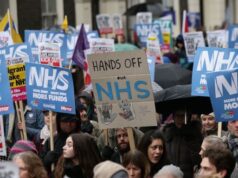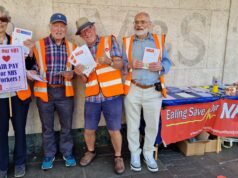This occasional newsletter is written and edited by a group of concerned residents in Ealing, West London, who want to preserve our NHS. We view the wholesale engagement of private, for-profit healthcare service suppliers as unnecessary, profligate and dangerous. Process improvement is what is needed in our NHS – not revolution.
‘NHS – once the envy of the world’
Launched in 1948 our National Health Service (NHS) pioneered universal healthcare free at the point of delivery and funded by a National Insurance tax. Local doctors, called General Practitioners (GPs), became part of the NHS service, but were never on the NHS payroll as employees. They have always been private contractors. Consultants too would not go on the payroll and not only were they retained as contractors, they got to use NHS facilities and equipment for treating their private patients.
In recent years over £100 billion has been spent annually to run and maintain the NHS in England. With 250,000 staff the NHS is the second largest workforce on earth (the Chinese Army is the largest).
The changing role of hospitals
The idea of hospitals is 2,500 years old. The first recognised hospital dates back to around 400BC in Sri Lanka. The traditional hospital idea is that it is a dedicated, secure site at which a range of research, testing, treatment, trauma, surgical and caring services are provided. Primary care (i.e. usual first point of patient contact) has traditionally been provided by GPs in England who until recently were not located in hospitals. Private hospitals have traditionally not provided Accident and Emergency (A&E) services.
Now all this is changing. In Ealing Hospital we have GPs with nurses running what is in effect a large General Practice. It’s called an Urgent Care Centre. A&E is closing down at Ealing Hospital and this will also happen at Central Middlesex Hospital. But luckily, and no doubt just by chance, a private Emergency Care Centre has recently opened in nearby Harrow at BMI’s Clementine Churchill Hospital. It’s a ‘self-pay walk in service’.
Sir David Nicholson, Head of the NHS gracelessly retires – but not until March 2014
This is the man who was recently implicated in the needless deaths of up to 1,200 patients at NHS Mid Staffordshire Hospital. Many feel he should have resigned months ago. We’ll still be paying his £211,000 annual salary until March 2014. His public pension pot is rumoured to be around £2 million.
Health and social care grants
Ealing Clinical Commissioning Group (the in-effect re-branded Primary Care Trust) admitted in April 2013 that because it had not finalised its budget, it could not commit to continuing paying health and social care grants beyond September 2013. Because of this a number of local care organisations who are dependent upon these grants are having to organise redundancies.
One does wonder what exactly is going on. The ECCG folks are largely the same people who were running the PCT. The ECCG has been meeting and working on the budget for many months. Just how credible is any organisation is which has not sorted out its budget after the beginning of its financial year?
Lack of Community Engagement Leads to Fury in Hanwell, Ealing as NHS Alcoholic and Drug Addict Recovery Centre Plans are Unveiled.
Some 100 residents and Councillors attended a public meeting on 7 May 2013. Since 1 November 2012 Recovery Intervention Services Ealing (RISE) has been providing drug and alcohol abuse treatment and recovery services .RISE is a consortium led by the charity Crime Reduction Initiatives (CRI). The EACH volunteer group and the NHS North West London Mental Health Trust (CNWL) are also involved.
RISE wants a base in the west of Ealing and has set its sights on The Studios in Cambridge Road, Hanwell. A Planning Application was submitted in January 2013 but it is still ‘Pending’. The application is incompetent in that it states that ‘the property is surrounded by other commercial properties’. This is so far from the truth as to be ludicrous. New flats are immediately to the north and established houses are immediately to the east and south. Some residents were clearly furious about this attempted deception. Other angry parents and residents pointed out that many children walked past The Studios to and from multiple schools. Others were annoyed that there had been no engagement with the local community during the formative stages of planning this drug addict/alcoholic centre. Many attendees made the point that they were aware of the problem and aware of the need for a treatment centre – but not on this site.
The obvious place to locate such a service would be a local, secure hospital site which had excellent public transport facilities. Both Ealing Hospital and St Bernard’s Hospital meet those criteria. However both hospitals are about to be largely demolished and much of the site ‘repurposed’ for housing. Also if this pantomime is an example of NHS NW London’s emerging ‘Out of Hospital’ strategy we are all justified in worrying about it.
Meltdown in A&E and the 111 telephone service?
A&E closed at Newark, Notts two years ago. Since then there has been a 37% rise in death rates (according to ‘The Mail on Sunday’). The FOI-obtained figures come from three NHS Trusts and cover six hospitals.
‘The Independent’ had a leaked letter from NHS leaders at 18 West Midlands Emergency Departments. Rising numbers of patients have created a ‘state of crisis’ in these Emergency Departments which handle 1.5 million patient attendances each year across a population of 5.36 million.
Nationally an extra million A&E patient attendances were recorded during the period January 2012 to January 2013.
The NHS Direct health advice service referred an extra 120,000 patients to A&E departments in the past year. This happened during a period when NHS Direct staffing levels dropped by 1,200 people. (Facts courtesy of ‘The Observer’). It doesn’t take a genius to appreciate the link between these two facts. Also, of the 143 Trusts that have large A&E units, only 18 have hit the target of treating 95% of patients within four hours.
Three deaths in Derbyshire and the West Midlands are being investigated in connection with the NHS 111 telephone advice service (‘The Telegraph’). The NHS 111 advice service is being progressively rolled out across the country to replace the NHS Direct advice service. Why? NHS 111 employs call handlers who are not clinicians. NHS Direct employed clinicians on the end of the phone. NHS 111 is no doubt much cheaper to run than NHS Direct.
50% Drop in Trainee Doctors and £500,000 spent annually by each trust
At a Select Committee on Health hearing on 22 May 2013 the College of emergency Medicine reported a 50% shortfall in trainee doctors and consultants. On average trusts spend £500,000 annually on locums.
NHS NW London A&E Closures
In March 2013 the Secretary of State agreed to refer the decision to close 4 of the 9 A&E departments in NHS NW London. The Seccretary of State decided to seek advice from the so-called Independent Reconfiguration Panel (IRP) on this.




